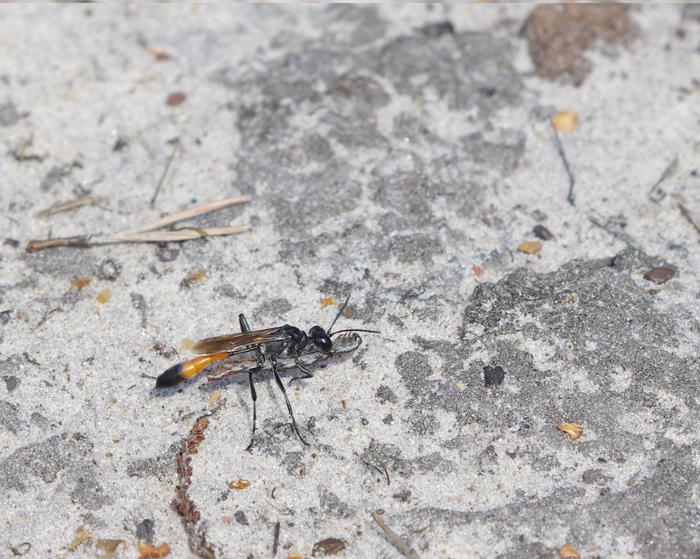
In the seemingly simple life of digger wasps, an extraordinary cognitive prowess has been unveiled, reshaping our understanding of insect intelligence and the complexities of parental care. Recent groundbreaking research has illuminated that female digger wasps possess a remarkable capacity for memory and scheduling, enabling them to manage multiple offspring with an efficiency and accuracy that rivals more cognitively advanced animals. This discovery not only challenges prevailing notions about insect brain function but also sheds light on the evolutionary drivers behind complex behavior in miniature nervous systems.
Digger wasps exhibit a sophisticated brood-provisioning behavior that involves constructing individual subterranean burrows for each egg, stocking these nests with paralysed prey, primarily caterpillars, and meticulously timing subsequent feeding visits. The wasp mothers return periodically over many days, sometimes provisioning as many as nine different nests simultaneously. Despite the demanding cognitive load this places on their small brains, they rarely err, successfully navigating among hundreds of interlaced nests belonging to other females in a featureless sandy environment. This impeccable nest recognition and retrieval ability indicate a nuanced spatial memory system that exploits subtle environmental cues.
Crucially, this memory extends beyond mere location tracking. Female wasps display a dynamic prioritization system when feeding their larvae, where the order is governed by the age of offspring, adjusted flexibly if any larva dies. This scheduling behavior reflects a form of strategic decision-making, ensuring that resources are allocated efficiently and that the risk of starvation in their brood is minimized. Perhaps most striking is their apparent capacity to modulate feeding timing based on the amount of nourishment previously received, delaying subsequent feedings for larvae that initially consume larger prey. Such behavior suggests an advanced interpretation of temporal and nutritional states, implicating a form of episodic or event-based memory.
Professor Jeremy Field, leading the study from the University of Exeter’s Centre for Ecology and Conservation, remarks that these findings reveal “remarkably sophisticated scheduling decisions” occurring within the “miniature brain of an insect.” This challenges the intuitive assumption that smaller brains equate to simpler behaviors. Instead, the wasps’ actions imply the presence of neural mechanisms capable of encoding “what,” “where,” and “when” information—elements defining what cognitive scientists term episodic-like memory, a function traditionally considered exclusive to vertebrates.
The investigative team studied populations of digger wasps residing in the heathlands of Surrey, UK, where the insects maneuver through visually sparse environments dominated by bare sand devoid of conspicuous landmarks. Despite this, wasps make remarkably few mistakes in identifying their own burrows, with less than 2% of feeding events mistakenly delivered to nests of other females. This high fidelity raises fascinating questions about the sensory and neural processes enabling such precise navigation in a highly cluttered social environment teeming with similar nests.
Experimental manipulations also underscored the cognitive flexibility of female wasps. When caterpillars in burrows were experimentally swapped or altered in size, mothers adapted their feeding schedules accordingly, delaying returns for larger prey while turning their attention to other offspring. This behavioral plasticity demonstrates that wasps not only recall spatial data but integrate dynamic contextual information, allowing complex decisions based on each offspring’s current status.
Neuroscientific principles inform us that memory capacity is costly, requiring both specialized neural hardware—such as neurons—and metabolic energy to function effectively. Insects, with their notoriously tiny brains consisting of millions rather than billions of neurons, raise the question of how such sophisticated memory and scheduling can be achieved efficiently. This puzzle has tantalized behavioral ecologists and neurobiologists alike, inviting speculation on how evolutionary pressures optimize brain structure for task-relevant cognition in miniature.
Previous laboratory studies have primarily focused on insect responses in controlled mazes or associative learning paradigms, often interpreting behavior in the narrow context of conditioned rewards. In contrast, this field-based research offers an illuminating window into the ecological relevance of memory faculties, demonstrating that the wasps’ cognitive adaptations confer tangible reproductive advantages in their natural wild settings. This shift towards ecological validity enriches our comprehension of insect cognitive ecology.
The research also has broader implications for theories of animal intelligence and the evolution of parental care strategies. The ability of female wasps to sequentially manage and provision multiple offspring, dynamically adjusting to changing brood conditions, mirrors scheduling challenges solved by higher animals. It highlights that even invertebrates may possess the neural substrates underpinning adaptive time-sensitive decision-making, a hallmark of complex intelligence.
From a methodological perspective, the study employed rigorous field observations combined with experimental interventions, including prey swapping, to dissect behavioral adjustments. Tracking nest visitation sequences and feeding intervals across hundreds of offspring provided robust data underscoring the precision and adaptability of maternal care. Such integrative approaches exemplify how ethological studies can illuminate cognitive mechanisms from real-world behavior.
In sum, this research overturns longstanding assumptions regarding insect cognition and showcases the cognitive sophistication embedded in the digger wasp’s tiny brain. The species’ capability to remember intricate sequences of activities across multiple nests, modulate provisioning schedules based on offspring needs, and successfully navigate a visually monotonous environment presents a compelling model for episodic-like memory in invertebrates. As Professor Field notes, understanding the “how” behind these feats remains a compelling scientific frontier, beckoning future neurological and ethological inquiry.
Subject of Research: Parental care and memory capacity in digger wasps
Article Title: Memory and the scheduling of parental care in an insect population in the wild.
News Publication Date: 9-May-2025
Web References: DOI: 10.1016/j.cub.2025.04.045
Image Credits: Professor Jeremy Field
Keywords: Insects, Ethology, Intelligence
Tags: brood provisioning in waspscognitive abilities in insectscognitive load in small animalsdigger wasp maternal behaviorevolutionary drivers of insect intelligencefeeding behavior of wasp mothersinsect brain function researchinsect memory skillsinsect parental care strategiesmemory and scheduling in waspsnest recognition in insectsspatial memory in digger wasps





